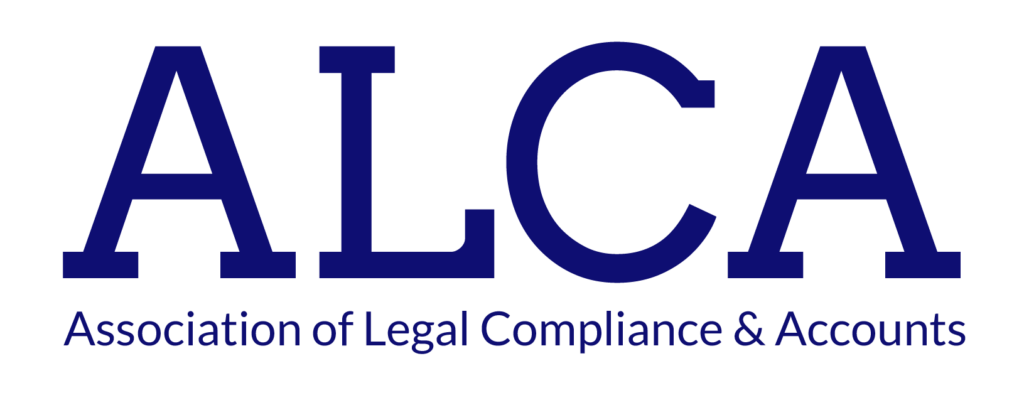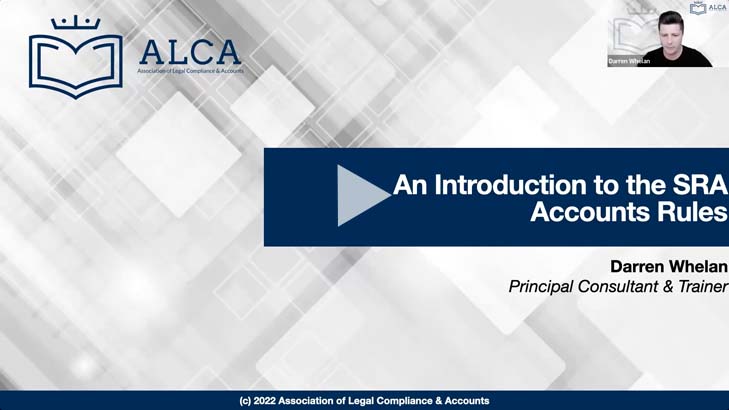An Introduction to the SRA Accounts Rules
Speaker: Darren Whelan
Length: 1 Hour 45 Minutes
Published September 24, 2022
Last Updated on May 1, 2023
Who is this training for?
This on demand workshop is for Solicitors, Lawyers, Accountants, Compliance Officers, COFA’s, Legal Accounts Professionals, Legal Cashiers and anyone that has any involvement in working in legal finance and compliance.
Purpose of this training?
This on demand workshop is designed to meet the needs of individuals seeking to learn about the SRA Accounts Rules and how they apply within a law firm. It is ideal for new starters and for those returning to legal practice and accounts.
The previous, highly prescriptive 2011 rules were reduced to just 13. The shorter rules offer law firms of different shapes, sizes and complexities the flexibility to introduce new systems, procedures and policies that both protect client money as well as introducing practicalities for the firm.
Whilst the SRA Accounts Rules have been significantly reduced in their length, careful consideration of the impact of the reduction is required to ensure that firms remain compliant.
- Introduction
- Client Money and Client Bank Accounts
- Legal Aid Money
- Client Account Exemption
- Management of Money and Timeframes
- Residual balances
- Banking Facilities
- Systems and Controls
- Client Bank Reconciliations
- Joint Accounts/Client Own Accounts
- Breaches
- Third Party Managed Accounts (TPMA’s)
- The Role of the Accountant and the Report
- SRA Additional Guidance
- Summary of the Changes 2011 -v- 2019
#1. Which one of of the following statements is correct?
#2. Your firm prepare a lot of wills and fixed fee interviews as one-off transactions for clients. However, instead of opening an individual client ledger for each client, you have a general ledger on which you record the details of each client and the costs received.
Is this a breach of the SRA Accounts Rules?
#3. You have paid a disbursement from the business account and now have sufficient money held in the client account towards it.
Are you required to send the client a bill or other written notification of costs prior to transferring the money from the client account to the business account?
#4. You operate various client’s own accounts. SRA Accounts Rule 10 appears to require you to carry out a bank reconciliation for these accounts.
Are you required to prepare a three way bank reconciliation every 5 weeks if you can’t obtain bank statements from the bank or building society?
#5. Is it permissible to issue the client with a bill of costs for an unpaid, not yet incurred, court fee?
#6. You’re firm is acting for the executors in dealing with the administration of a deceased person’s estate and have sent a bill to the executors, together with the estate accounts for approval. You have asked the solicitor that is acting if you can transfer costs from the client account to the business account to discharge the bill in full. The solicitor has replied “no, as costs are not properly due”.
Is this a breach of SRA Accounts Rule 4.2?
#7. The client bank reconciliation must be signed by:
#8. Who sets out the key objectives that all regulators must achieve?
#9. A “qualified” accountant’s report means:
#10. Money received from the Legal Aid Agency on account of disbursements that are not yet incurred or paid is?
Further Information
Accounts & Finance Practice Notes (Subscriber Resource Only)
Compli-Q – Compliance FAQs (Subscriber Resource Only)
Practice notes and training sessions represent the Association of Legal Compliance & Accounts’ view of good practice in a particular area. They are not intended to be the only standard of good practice that firms can follow.
Practice notes and training sessions are not legal advice, and do not necessarily provide a defence to complaints of misconduct or poor service. While we have taken care to ensure that they are accurate, up to date and useful, we will not accept any legal liability in relation to them.
Frequently Asked Questions
It’s really simple:
- Reduced cost
- Can be watched anywhere, anytime on any device – no travel time or cost
- Shorter and more efficient than face-to-face
- Recorded and can be replayed at your leisure
Online – the Cons
On Demand is not for everyone one. People learn differently and watching a pre-recorded training video can feel very lonely and isolated. It requires strong, self-motivation and time management skills. There is no opportunity to ask a question and receive an answer straight away as you would with an online or a face-to-face workshop.
No. In order to watch them, you must watch them whilst logged into the website.

